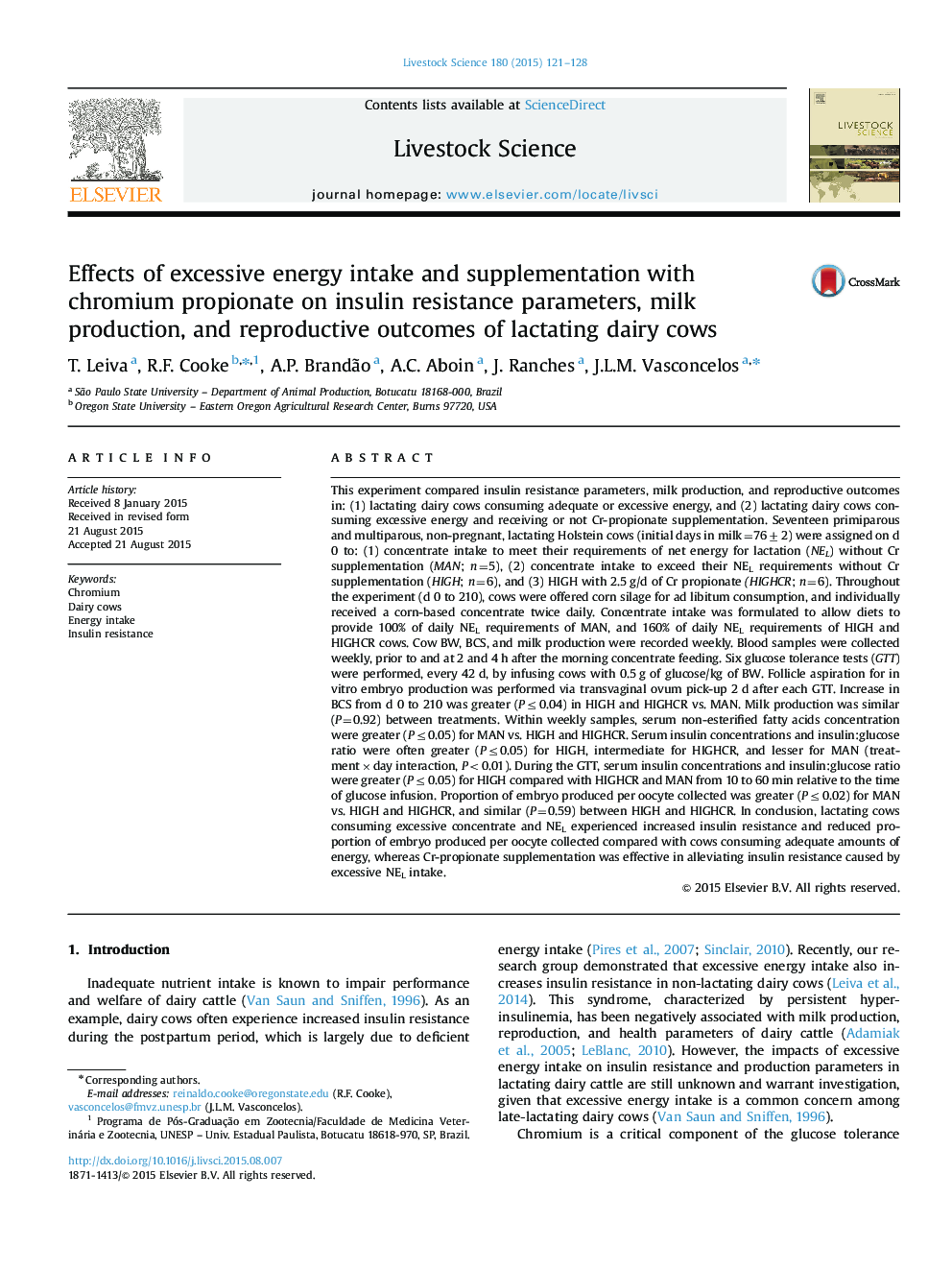| کد مقاله | کد نشریه | سال انتشار | مقاله انگلیسی | نسخه تمام متن |
|---|---|---|---|---|
| 2447030 | 1553952 | 2015 | 8 صفحه PDF | دانلود رایگان |
• Excessive energy intake increased insulin resistance in lactating dairy cows.
• Excessive energy intake impaired embryo production from oocytes collected.
• Cr-propionate alleviated insulin resistance caused by excessive energy intake.
• Excessive energy intake and Cr-propionate supplementation did not impact milk yield.
• Proper energy and Cr-propionate intake alleviate insulin resistance in dairy cattle.
This experiment compared insulin resistance parameters, milk production, and reproductive outcomes in: (1) lactating dairy cows consuming adequate or excessive energy, and (2) lactating dairy cows consuming excessive energy and receiving or not Cr-propionate supplementation. Seventeen primiparous and multiparous, non-pregnant, lactating Holstein cows (initial days in milk=76±2) were assigned on d 0 to: (1) concentrate intake to meet their requirements of net energy for lactation (NEL) without Cr supplementation (MAN; n=5), (2) concentrate intake to exceed their NEL requirements without Cr supplementation (HIGH; n=6), and (3) HIGH with 2.5 g/d of Cr propionate (HIGHCR; n=6). Throughout the experiment (d 0 to 210), cows were offered corn silage for ad libitum consumption, and individually received a corn-based concentrate twice daily. Concentrate intake was formulated to allow diets to provide 100% of daily NEL requirements of MAN, and 160% of daily NEL requirements of HIGH and HIGHCR cows. Cow BW, BCS, and milk production were recorded weekly. Blood samples were collected weekly, prior to and at 2 and 4 h after the morning concentrate feeding. Six glucose tolerance tests (GTT) were performed, every 42 d, by infusing cows with 0.5 g of glucose/kg of BW. Follicle aspiration for in vitro embryo production was performed via transvaginal ovum pick-up 2 d after each GTT. Increase in BCS from d 0 to 210 was greater (P≤0.04) in HIGH and HIGHCR vs. MAN. Milk production was similar (P=0.92) between treatments. Within weekly samples, serum non-esterified fatty acids concentration were greater (P≤0.05) for MAN vs. HIGH and HIGHCR. Serum insulin concentrations and insulin:glucose ratio were often greater (P≤0.05) for HIGH, intermediate for HIGHCR, and lesser for MAN (treatment×day interaction, P<0.01). During the GTT, serum insulin concentrations and insulin:glucose ratio were greater (P≤0.05) for HIGH compared with HIGHCR and MAN from 10 to 60 min relative to the time of glucose infusion. Proportion of embryo produced per oocyte collected was greater (P≤0.02) for MAN vs. HIGH and HIGHCR, and similar (P=0.59) between HIGH and HIGHCR. In conclusion, lactating cows consuming excessive concentrate and NEL experienced increased insulin resistance and reduced proportion of embryo produced per oocyte collected compared with cows consuming adequate amounts of energy, whereas Cr-propionate supplementation was effective in alleviating insulin resistance caused by excessive NEL intake.
Journal: Livestock Science - Volume 180, October 2015, Pages 121–128
